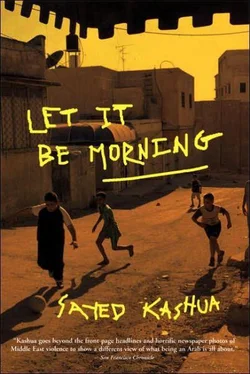As always, we’re eating supper at my parents’. It’s been almost two months since we moved here, and we still haven’t cooked so much as a single meal. My wife and my older brother’s wife are sitting in the kitchen talking about the schools where they work. My older brother’s wife is a teacher too. She teaches science in junior high. They’ve known one another since their college days. My three-year-old nephew is chasing a ball from the kitchen into the living room. Every few minutes he screams, “Goal,” and my brother cheers. My mother’s in the living room, holding my daughter in her arms and rocking her to sleep. My father’s in his customary spot on the sofa, looking preoccupied, a bit more than usual, scratching his palms and waiting for another newscast. In Hebrew this time.
There isn’t much to do in this village except sit around with one of our families, mine or my wife’s. Actually, the two houses we were born in, my wife and I, have become the two focal points of our lives. And we’re not the only ones. Everyone here is like that. The life of my older brother and his wife, for instance, revolves around the homes of his in-laws and our parents, even though they tend to cook at their own home from time to time and to have dinner on their own too. Whenever they do, it upsets my mother. “I don’t mind that she cooks,” she says. “Every woman likes to feed her husband, but why don’t they let me know? What am I supposed to do with all the food I cooked? Isn’t it a shame to let it go to waste?”
My wife prefers to eat at her parents’ house. She says she feels more comfortable eating there, and she doesn’t get the feeling that someone is watching her the way she does at my mother’s.
Even though I enjoy my brother-in-law’s company, and even though he’s really the only person outside of my immediate family that I talk to in this village, I don’t feel comfortable staying for too long at my wife’s parents’ place. Certainly not now, certainly not when my wife is mad at me, and the devil knows what she’s been saying about me to her mother, who generally looks like she resents me and makes me feel I’m the reason for her daughter’s unhappiness. I suppose it’s true, but I can always claim that the reverse is true too, except I would never complain and I would always take what I have coming to me without trying to change things or improve them. And when it comes to my relations with my wife, I’d say I’m a believer.
My wife constantly blames me for the fact that we’ve returned to this stifling, bleak village that has nothing to offer her. She mentions my brother and his wife, who take their son from time to time and head for a shopping mall in one of the nearby cities. We go sometimes too, even though I’ve never figured out why people enjoy spending time at shopping centers, and I’ve never understood the smile on my wife’s face as she strolls through the shops and along the food court, even if she’s not about to buy anything.
Every time one of her friends or relatives goes abroad, she goes into mourning, and I’m the object of her litany about how I stole her dream of traveling to a different city, a different country. I’ve stolen her dream of big hotels and even bigger shopping malls. We’ve never taken an airplane, we’ve never left the country. I’ve always said we don’t have enough money to pay for such a trip, and that’s the truth, even though it’s not what my wife would like to hear. I’ve never felt I needed those trips. Never gave it a second thought. On the contrary, I find it hard to picture what it is that makes them enjoyable. For some reason, as far as I’m concerned, leaving the country is something I could only do in one direction. I mean, when I think of a plane and of another country, I think of it only as a way of emigrating, of escaping, of deciding never to return here — not ever, not even for a visit.
True, there isn’t much to do here even if you’d like to. Unlike the city, which offers lots of stimuli even though I hardly ever feel like doing anything there either. And yet, I don’t feel more bored here, and I don’t get the urge to do more than what the village routine has to offer someone like me — hanging out in your parents’ living room.
There are several cafés in the village, all for men. But generally the men there are much older than me and they pass the time playing cards and tawlah . I don’t like those games, to tell the truth. I’ve even managed to forget the rules, which I learned from my father long ago. My father sits in cafés every day. Every afternoon he dresses up, as if he’s been invited to an official event, and heads for the café where he’s been a regular for decades. He plays with his usual partners, the same three teachers he’s been playing against for as long as I can remember. He spends his afternoons there, coming home in time for evening prayers. My brother-in-law Ashraf told me there’s a place called the Purple Butterfly too, at the outskirts of the village where you can order alcoholic beverages. Ashraf burst out laughing when I suggested that we go have a drink there. He said the only people who ever went there were the heavy drinkers that everyone in the village knows. “What’s gotten into you?” He laughed. “Are you nuts? D’you want to come home with an eye and a foot missing, and be ostracized by your family?”
According to Ashraf’s stories, some people from the Islamic Movement had tried to set fire to the Purple Butterfly a few times. In fact they actually did burn it down once, and the owner had insisted on rebuilding it. The pub is holding on, and continues to be the only place in the village where they sell alcohol — thanks to the protection of a gang that charges the owner a monthly fee, not to mention a free run of the bar for the gang members. “They deserve a place where they can have a drink too, don’t they?” Ashraf says, and laughs, the way he always does when he tells me those stories. “Something close to home that could get them through withdrawal without their having to go all the way to Tel Aviv for a swig of arrack.”
Apart from driving through the streets with radios blaring full blast, the favorite pastime of people around here is weddings. In summer, weddings are an alternative to discotheques. That’s where bachelors can fan their tails and do their mating dances, that’s where they can really let go and sweat, and stomp their feet for hours on end. The weddings provide another setting, another arena for the machismo match. Bachelors like Ashraf spend almost every summer evening at weddings. He told me that he and some of his friends used to go to Tel Aviv regularly and try their luck at the dance clubs they’d read about in the papers or heard about from the other students, except they never got past the bouncer and had to make do with spending yet another night at one of the dives that admitted just about anyone. “We’d go into places that you wouldn’t believe. You’d have the feeling a murder was just waiting to happen, someone was about to waste an enemy or something,” he chuckled. “There’s nothing like weddings. It’s the best bet. Trouble is that if you wind up at an Islamic wedding, you’re done for. Sure, everyone’s a Muslim, and everyone’s becoming religious lately, but I’m talking about the ones who decide that instead of a wedding with music and dancing they’ll invite a sheikh to read verses from the Koran and a religion teacher to lecture about the shocking behavior of today’s young people at the promiscuous weddings taking place right here in our own village. Lots of people are into that nowadays, and you can’t tell anymore what to expect. Sometimes we have to do three weddings in a single evening before we find one without a sheikh.”
Читать дальше












